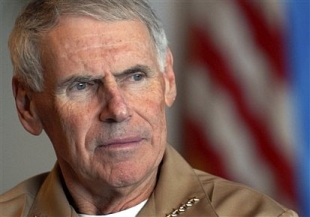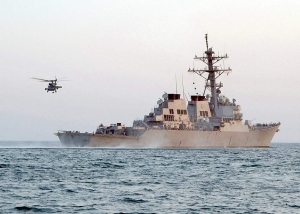Picture of secret detentions emerges in Pakistan
By Carlotta Gall, New York Times, December 19, 2007
The director of the human rights commission, I. A. Rehman, said the government had set up a nearly invisible detention system. “There are safe houses in Islamabad where people are kept,” he said, citing accounts from the police and freed detainees. “Police have admitted this. Flats are taken on rent; property is seized; people are tortured there.”
In some cases, detainees recounted that they had been interrogated in the presence of English-speaking foreigners, who human rights officials and lawyers suspect are Americans.
A United States Embassy spokeswoman said she could not comment on the allegations and referred all questions to Washington. A spokesman for the Central Intelligence Agency, Mark Mansfield, declined to comment on Mr. Rehman’s accusations, or on any specific detainees.
One detainee, a Jordanian named Marwan Ibrahim, who was arrested in a raid in the city of Lahore, where he had been living for 10 years, said he was sent to a detention center in Afghanistan run by Americans, then to Jordan and Israel, and was finally released in Gaza, according to an account Mr. Ibrahim gave to Human Rights Watch, another independent group.
Another detainee, Majid Khan, 27, a Pakistani computer engineer who disappeared from Karachi four years ago, surfaced April 15 this year before a military tribunal in Guantánamo Bay. His American lawyers say he was subjected to torture in C.I.A. detention in a secret location. Mr. Mansfield, the C.I.A. spokesman, declined to comment, except to say that the “C.I.A.’s terrorist interrogation effort has always been small, carefully run, lawful, and highly productive.” [complete article]
FBI, CIA debate significance of terror suspect
By Dan Eggen and Walter Pincus, Washington Post, December 18, 2007
According to Kiriakou’s account, which he said is based on detailed descriptions by fellow team members, Abu Zubaida broke after just 35 seconds of waterboarding, which involved stretching cellophane over his mouth and nose and pouring water on his face to create the sensation of drowning.
But other former and current officials disagreed that Abu Zubaida’s cooperation came quickly under harsh interrogation or that it was the result of a single waterboarding session. Instead, these officials said, harsh tactics used on him at a secret detention facility in Thailand went on for weeks or, depending on the account, even months.
The videotaping of Abu Zubaida in 2002 went on day and night throughout his interrogation, including waterboarding, and while he was sleeping in his cell, intelligence officials said. “Several hundred hours” of videotapes were destroyed in November 2005, a senior intelligence officer said. The CIA has said it ceased waterboarding in 2003. [complete article]
Former U.S. interrogator recounts torture cases in Afghanistan and Iraq
El Mundo (via Informed Comment), December 10, 2007
But Bagram has an underworld in which the CIA tortures the leaders of Al-Qa’idah. “One day I went to an interrogation session and as soon as I arrived I knew that it was not a normal case. There were civilians, among them a doctor and a psychiatrist. The prisoner was called Omar al-Faruq, an Al-Qa’idah leader in Asia who had been brought to the prison by one of those agencies”, recalls Corsetti. “I don’t want to go into details because it could be very negative for my country, but he was brutally beaten – daily. And tortured by other methods. He was a bad man, but he didn’t deserve that”. Al-Faruq escaped from Bagram in action which, according to some, was tolerated by the USA and was killed in April 2006 by the British in the Iraqi city of Basra.
Corsetti says that he never took part in the torture. “My sole job was to sit there and make sure the prisoner didn’t die. But there were several times when I thought they were about to die, when they were interrogated by those people who have no name and who work for no-one in particular. It’s incredible what a human being can take”. A resistance similar to that of the memory of those torture sessions. Because Corsetti, a veteran of two wars, says: “I have seen people die in combat. I shot at people. That is not as bad as seeing someone tortured. Al-Faruq looked at me while they tortured him and I have that look in my head. And the cries, the smells, the sounds, they are with me all the time. It is something I can’t take in. The cries of the prisoners calling for their relatives, their mother. I remember one who called for God, for Allah, all the time. I have those cries here, inside my head”.
“In Abu-Ghurayb and Bagram they were tortured to make them suffer, not to get information out of them”. And the fact is that at times the torture had no other goal that “to punish them for being terrorists. They tortured them and didn’t ask them anything”. That is the case of the practice known as “the submarine”: to simulate the drowning of the prisoner. “They have them hooded and they pour water on them. That makes it very difficult to breath. I think you can’t die with the submarine. I certainly never saw anyone die. However, they do cough like crazy because they are totally submerged in water and that gets on their lungs. Perhaps what it can give you is serious pneumonia”. The civilians who took part in the interrogations used the submarine whenever they wanted. They gave it to them for five or 10 minutes and didn’t ask anything”. [complete article]
The president’s coming-out party
By Scott Horton, Harper’s, December 15, 2007
The Justice Department has announced an “initial probe” into the destruction of the CIA torture tapes. There is no credible basis upon which this can be viewed as anything other than a conscious crime. The tapes were destroyed, even according to sources within the CIA, because of imminent fear that they would constitute evidence in a criminal prosecution of persons involved in the acts of torture. And even beyond this more general concern, they were destroyed so they would not be turned over to a federal judge who was demanding them. They were destroyed to protect a series of false official statements about the way individual prisoners, whose statements would be used in evidence, were in fact being treated.
Remember, in these trials, a defendant can seek to exclude evidence if it was secured through torture. But the defendant has an obligation to prove this contention. The tapes would have provided such proof. Destroying them would therefore help make the evidence admissible.
Note also, no one has ever even raised the possibility that the destruction was inadvertent or accidental.
All that being said, we should ask: why do we need an “initial assessment”? Things couldn’t possibly be more clear. It is as if Julius Caesar was stabbed to death on the floor of the senate with a hundred onlookers, and now the Justice Department wants to weigh carefully whether there is evidence sufficient to justify a homicide investigation. [complete article]
Congress defies Bush on CIA tape probe
By John Cochran, ABC News, December 17, 2007
House Intelligence Committee chairman Silvestre Reyes told ABC News today that he will ignore the Bush administration’s request to drop its investigation of why CIA interrogation tapes were destroyed.
“This is an administration that frankly does not have a good track record of policing itself,” Reyes said. “We intend to go forward and issue subpoenas next week because we are a whole equal branch of government.”
After telling Congress to get out of the way, the Justice Department took the highly unusual step of telling the same thing to a federal judge.
In 2005, Judge Henry Kennedy ordered the government not to destroy any evidence of mistreatment or torture at the detention center at Guantanamo Bay, Cuba. The Administration says that because the destroyed tapes were interrogations of two suspects in secret CIA prisons, not at Guantanamo, the judge should not interfere.
“This is becoming increasingly bizarre,” said Jonathan Turley, a professor at George Washington University Law School. “The Justice Department insists it will essentially investigate itself and then tells the court that because it is investigating itself it won’t turn over evidence of its possible criminal misconduct. It’s so circular, it’s maddening.” [complete article]
See also, Yemeni man imprisoned at CIA “black sites” tells his story of kidnapping and torture (Democracy Now) and Negroponte warned CIA against destroying the torture tapes (TPM).
 There is a view abroad, commonly held, that Admiral William “Fox” Fallon has been sacrificed, has been gotten out of the way, by the Bush Administration because he disagreed with its policies on Iran. That Fallon stood in the way of the neo-Conservative cabal who is bent on expanding the Middle East conflict and that, when given the order for the attack (at some point in the future), Fallon would have courageously refused the order and reversed the tide of history.
There is a view abroad, commonly held, that Admiral William “Fox” Fallon has been sacrificed, has been gotten out of the way, by the Bush Administration because he disagreed with its policies on Iran. That Fallon stood in the way of the neo-Conservative cabal who is bent on expanding the Middle East conflict and that, when given the order for the attack (at some point in the future), Fallon would have courageously refused the order and reversed the tide of history.
 One Defense Department official, who spoke on the condition of anonymity to describe early reports from the Navy’s regional headquarters in Bahrain, said that the Iranian boats made a radio threat that the American ships would explode.
One Defense Department official, who spoke on the condition of anonymity to describe early reports from the Navy’s regional headquarters in Bahrain, said that the Iranian boats made a radio threat that the American ships would explode.